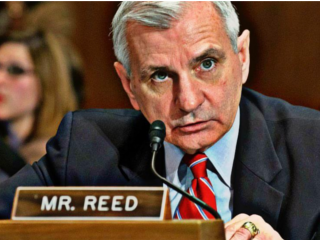
In 1996, the people of Rhode Island elected Jack Reed to succeed Claiborne Pell as Rhode Island’s 46th United States Senator.
Senator Reed works every day to help make the federal government more efficient, effective, and responsive to the people of Rhode Island. He has a proven record of working on a bipartisan basis to help solve problems and achieve results. Senator Reed was part of the bipartisan working group that drafted the Coronavirus Aid, Relief, and Economic Security (CARES) Act and successfully led efforts to create the $150 billion Coronavirus Relief Fund to help states combat COVID-19. Senator Reed also helped include a $1.25 billion small state minimum to ensure Rhode Island could effectively respond to the pandemic.
As one of just eight Senators in U.S. history to graduate from West Point, Time magazine noted: “Reed is a serious, intellectually honest veteran and an expert on defense issues in the Senate,” and the New York Times describes him as “a quiet deal-maker respected by colleagues in both parties.”
A senior member of the powerful Appropriations Committee, which controls the funding of the federal government, Senator Reed has been described by the Boston Globe as “a relentless advocate for his home state.” He works tirelessly to direct federal funding to the Ocean State to create jobs, strengthen its infrastructure, and support economic and community development initiatives.
He has supported clean water projects to ensure both a healthy economy and a healthy environment. And he authored a trio of laws to improve children’s health care and ensure our youngest patients get the help they need when they need it: the Childhood Cancer Survivorship, Treatment, Access, and Research (STAR) Act to advance pediatric cancer research and child-focused cancer treatments, improve childhood cancer surveillance, and provide resources for survivors and those impacted by childhood cancer; the Trauma Care Systems Planning and Development Act to establish critical care networks nationwide so that more paramedics and first responders can get trauma care patients to the right doctor at the right time; and the Better Pharmaceuticals and Devices for Children Act (BPDCA) to help ensure drugs and medical devices are specifically tested, labeled, and proven to be safe and effective for children.
Senator Reed has led efforts to strengthen Rhode Island’s transportation network – from expanding the runway at T.F. Green Airport to increasing capacity at our ports – in order to bring more jobs and businesses to Rhode Island and better link our state to the global economy.
Reed also serves as Chairman of the Armed Services Committee, where he has played a pivotal role in safeguarding our nation. In 2002, he voted against giving President George W. Bush the authority to go to war in Iraq because it was an ill-planned diversion from the war on terrorism. But he has always worked across the aisle to support our troops, and was instrumental in convincing Defense Secretary Robert Gates to continue serving in the Obama Administration and implement the plan to withdraw forces from Iraq.
Rhode Island’s defense industry is critical to national security and our state’s economy, and Senator Reed has been a leader at the federal level in growing Rhode Island’s defense sector and bringing resources to the state. Thanks to his efforts on the Armed Services and Appropriations Committees, coupled with Rhode Island’s talented defense workers, the U.S. Navy plans to begin building the next generation of submarines in the Ocean State, creating thousands of new, good-paying jobs in Rhode Island in the coming years.
As a senior member of the Banking, Housing, and Urban Affairs Committee, Reed authored several key pieces of the historic Wall Street reform law and has been nationally recognized for his dedication to protecting U.S. consumers. When taxpayers were forced to invest in banks to save the economy from total collapse, Jack Reed wrote the law ensuring that taxpayers would share in the rewards when the banks recovered. As a direct result of Reed’s provision, taxpayers have earned nearly $10 billion in additional dividends – money that would have otherwise been kept by the rescued banks.
He also helped create the Consumer Financial Protection Bureau (CFPB) to give American families the tools to fight unfair and abusive financial products and services, as well as a new Office of Financial Research (OFR) that will help provide early warnings to regulators about future financial problems.
Additionally, he authored laws to create a new affordable rental housing trust fund, improve consumer disclosures on mortgages, and address the needs of middle-class families who have struggled with the fallout from the housing crisis.
Senator Reed has been a leading voice on college affordability and student loan debt issues. He helped write laws preventing interest rate increases on new loans to millions of college students, and fought efforts to increase student borrowing costs. He recently proposed a Student Loan Borrowers Bill of Rights and has offered legislation to reform disclosure and servicing standards for both federal and private student loans.
And to help get our country back to full employment, he wrote a work-sharing law that provides an estimated $500 million for business-state partnerships to help prevent layoffs. Nationwide, Reed’s law has been credited with saving more than 130,000 jobs since 2012, including over 1,000 in Rhode Island.
Today, Jack Reed continues to utilize the lessons he learned growing up in Cranston, which were deepened in the Army and tested in the halls of Congress, to stand up and speak out for the hard-working families who are the heart and soul of our country.
